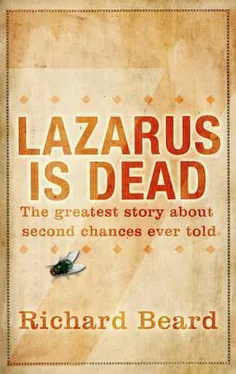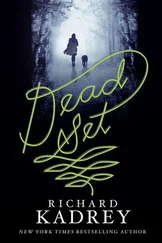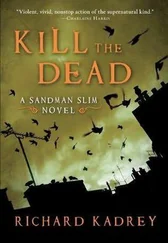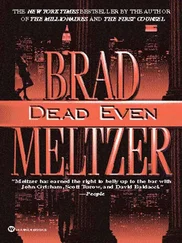Three or four boys about the same age converge at the corner of the street. They swear on their hearts they’ll follow him to Nazareth and beyond, escaping Nain to live the life of heroes. Their born-again friend nods his head in gracious acceptance of destiny. This, it seems, is what happens to the resurrected. Ordinary life loses its everyday charm.
The leader and his followers and the Sicarii assassin leave the village. They walk in the dark for an hour, then stop in the woods at the foot of Mount Deborah. The boys make a fire beneath the trees and when the son of the widow of Nain lies down, his disciples also lie down to sleep. They do whatever he does, because they too would rather not die.
Baruch waits until the night is calm, and then some more until the fire goes cold. The boy does not glow. There is no protective shield visible around his sleeping body. Baruch is behind a tree, in the clearing, kneeling beside the head of the son of the widow of Nain who is growing his first moustache. On his chin individual hairs are visible.
The wind moves branches in the pines, and Baruch is alert to every nuance of the night. He senses no divine force poised to resist him, not even a providential moon to betray his light-footed presence.
He reaches for his dagger. The night air does not prevent him. A viper slides along the track. The dagger slips in Baruch’s hand. The boy wakes. Baruch catches the dagger and kneels on his victim’s chest, his free hand clamping tight to the boy’s mouth.
Baruch sees it in the eyes — the boy does not want to die, not again, not yet. This is a death like any other. Baruch jams the dagger in through the stomach and up beneath the ribs, his other hand blocking the boy’s airways. He leans close to ensure his voice is the last sound the boy will hear on earth.
‘God’s wrath is coming,’ Baruch whispers. ‘Here is god’s wrath, today.’
The body convulses. Baruch lies over him until the spasms subside and the body is still. His disappointment is complete. Nothing ever changes.
Baruch retrieves his knife and cleans it on the boy’s clothes. Then he scoops a pile of ash from the edge of the firepit and rinses his hands. He smears the blood-dampened ash over his forehead and cheeks, into his beard and over his ears and neck.
The darkness and the shadows reclaim him.
At the Bethesda pool, just outside the city walls, a paralysed man has picked up his mat and walked. Despite the number of witnesses, the city of Jerusalem continues about its business. The Temple is unruffled and Romans patrol their watches; there is no recorded impact on daily life and Jesus goes home to the Galilee.
He has fallen short where it matters, in Jerusalem, where to make an impression he’ll need more than a simple healing.
Cassius is satisfied, up to a point. He has kept the two friends apart, forcing Jesus to settle for a smaller event than whatever they’d originally planned. There is no evidence that the Bethesda miracle is followed by any kind of popular acclamation. The Sanhedrin are indignant because the miracle happens on the Sabbath, otherwise nothing.
Nobody is overwhelmed. Jesus hasn’t persuaded either the Sanhedrin or the general public to back him, and Cassius is beginning to doubt his qualifications as a client messiah. He needs a messiah who can mobilise support and change attitudes, not a provincial impostor maddened by the desert, beguiled by daydreams and the promise of heavenly reward.
Jesus can’t even help his friends.
Everywhere, it seems, Jesus and his believers are in retreat. In Galilee Jairus changes his story: his daughter did not die and come back to life. She was asleep, then she woke. Her father swears that this is so.
In Nain, the son of the widow is found stabbed to death in a wood.
2
During his ministry Jesus makes one public pronouncement about Lazarus. The message is encoded, and it confounds a Roman speculatore as completely as scholars down the centuries.
This is Roger Hahn from The Voice , an internet source of bible commentary: ‘Lazarus is the name applied to the poor beggar in the parable of The Rich Man and Lazarus in Luke 16: 19–31. However, there appears to be no connection between the literary figure in the parable and the brother of Mary and Martha.’
There are many observers, even within the Church, who prefer to deny the reach of Lazarus, and his unique ability to discomfort Jesus. They don’t want Lazarus to be fully alive before he dies, because this can distract from what others see as the more important resurrection. Look. It’s obvious.
‘ At his gate was laid a beggar named Lazarus, covered with sores and longing to eat what fell from the rich man’s table. Even the dogs came and licked his sores ’ (Luke 16: 20–21).
Jesus rarely names the characters in his parables. Here he makes an exception, and chooses the name of his only identified friend. This Lazarus, too, the one in the parable, is sick and dying. Coincidence? Remember that a parable is fiction, and Jesus can determine every element in the story.
‘Lazarus’ is not a name picked at random, the first that enters his head. It is chosen for a reason. Think it through, analyse the coincidence as Cassius does. He is paid to find connections: that’s how he understands the world working, and how Rome keeps control of an empire.
In Bethany, at precisely the moment the paralysed man picks up his mat and walks, the smallpox enters its second phase.
There is nothing Lazarus can do. The Variola virus in his mouth and throat spreads to small blood vessels inside the skin. A low-level papular rash moves upwards to his forehead, where each pap grows into a raised blister, round, firm to the touch, but also deeply embedded. The blisters move to his upper arms, his upper legs, and proliferate across his trunk, front and back. The pustules begin to leak.
Lazarus is tired, and he swallows a plug of vomit. He plucks at his clothes to ease the itching.
‘You should be angry,’ Yanav says. ‘Furious. Let bad luck fill you with rage. Rage can help.’
No sense of injustice can stall the emerging smallpox, nor the consumptive cough nor the floods of nausea. Lazarus aims at defiance, but is unsettled by sweats and aches and insomnia, and several times comes close to a malarial coma. Yanav pulls him back with large draughts of water, a treatment he’d learned in Babylon.
During the day Lazarus sits slumped inside the house, out of sight of the village, occasionally helped to the latrine. His urine is pink with blood, and he feels as if insects are breeding in his eyes.
When he does sleep, for however short a time, his eyes glue closed.
1
‘ The time came when the beggar died .’
In the parable, angels carry poor, diseased Lazarus to heaven, while the rich man named Dives dies and goes to hell. The prophet Abraham appears to Dives and explains the balance of the afterlife: ‘ Lazarus received bad things, but now he is comforted here and you are in agony .’
While Jesus is telling this parable, Lazarus is in daily agony in Bethany, for reasons no one understands. Jesus is both warning and consoling him: you will suffer and you will die but everything, I promise you, will turn out fine. Trust me. Believe in me.
Jesus in his turn has to trust that his words will reach Lazarus by the same channels as his miracles, by hearsay and messenger. He can’t contact Lazarus directly because the seventh miracle, the raising of Lazarus, has to have maximum impact. Only then will all eyes turn on Jesus when he enters Jerusalem for the final time. To achieve the necessary element of surprise, there can be no suggestion of advance collusion between the two former friends.
Читать дальше












